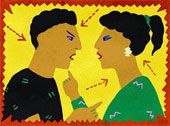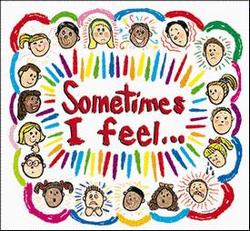I have created a workshop where you can play with experiencing your emotions in the waking state, the dreaming state, and particularly the state of awakening. Together, we can discover another way to benefit from our dreams.
At this point, in both my waking state and in all my dreams, I aspire to fully experiencing my emotions instead of projecting them outwards or stuffing them inside. I don’t need to avoid them in order to appear more ‘mature’ or less ‘crazy.’ Dissolving or discharging them by experiencing them fully eventually leads me to a more peaceful and centered place [2].
I don’t think I really ‘processed’ my feelings during past painful life incidents, especially during childhood. Interestingly, I am spontaneously having non-lucid dreams where I experience an uncomfortable incident over again. These dreams give me a chance in the dream, or just as I wake up, to fully feel my emotion without resistance or judgment. I notice how the emotion affects my body, my breathing, and my thoughts, and likewise, how these three affect my experience of the emotion. I believe that this process has removed many barriers to my experiencing a more whole and loving self.
Notice that the above process merely takes ‘awareness.’ In this workshop, I will also ask you to attempt to induce dreams and modify dream conditions if you become lucid. However, you do not need to do so to participate. Even if you don’t admit to having emotions or dreams, or you see emotions as ‘childish,’ play along and use your imagination. You may get enlightened.
Do the following exercises and report what happened. You can choose or use any emotions. If you don’t want to deal with uncomfortable emotions, you can choose feelings, such as joy or compassion. Keep in mind that a joyful experience can lead to self expansion, but you may see more amazing results by facing up to a feeling that you normally resist.
During the day:
Remain aware of any uncomfortable or frustrating feelings, or joyful ones, if you choose. When possible, stop what you are doing. Really feel the emotion that comes up for you. Immediately scan your body and breath. Notice your thoughts and your environment, including other people.To start, you can label the emotion.
 For example, say to yourself, “I
really feel
hurt.” Do not try to focus on any thoughts such as, “He did not act
fairly.” Aim at not replaying the ‘story’ of what happened or expanding
the emotion. Your emotions may seem out of proportion because another
person may have triggered a past emotion that never got discharged. See
an example of this in Appendix A.
For example, say to yourself, “I
really feel
hurt.” Do not try to focus on any thoughts such as, “He did not act
fairly.” Aim at not replaying the ‘story’ of what happened or expanding
the emotion. Your emotions may seem out of proportion because another
person may have triggered a past emotion that never got discharged. See
an example of this in Appendix A.
Next, relax and move any stressed muscles. Slow down, lengthen, or quicken your breathing. Do your feelings change? At the end of the day, review what happened and post your experiences on this thread.
At bedtime:
 If you so
desire, do what you
can to intend or incubate a dream with emotion.You can even choose to
dream of a past incident when you did not fully experience an emotion,
such as a feeling that might arise at the end of a relationship.
If you so
desire, do what you
can to intend or incubate a dream with emotion.You can even choose to
dream of a past incident when you did not fully experience an emotion,
such as a feeling that might arise at the end of a relationship.
Intend to pay close attention in your dream to how you are experiencing your feelings and noticing your body, breath, thoughts, and environment, as you did in your waking state. The waking state exercises should help you remember to do this. Experience and notice all of these NOW, and remind yourself to do so as soon as you begin to wake up.
During the dream:
For lucid dreamers: if your intention does not manifest at the start of your dream, you can call forth the people from the incident, or go to the place where the emotional experience occurred. Replay the scene as much as possible. Rather than tell yourself, “I am merely dreaming,” really delve into any feelings, such as fear, anger, hurt, or joy. You do not need to resist the feelings, project blame, or take on guilt. However, do not resist any resistance or judgment. Merely stay aware of them. Lucid dreamers can also start breathing differently, stretching, or moving around. See the example lucid dream in Appendix B.When you awaken:
Most importantly, for all dreamers: as you awaken, look for and stay with any emotion you just had or are still experiencing. You can do this many times during the night, or just before you get out of bed. Even if you don’t remember any dreams or feel any emotions, stay with your experience and pay attention to your thoughts, body, breath, and environment.If you do remember a dream, do not focus on the ‘story,’ but pay attention to the feelings you had or still have. If it happens naturally, let out any tears or grunts. However, do not amplify the feeling, especially by thinking of the details of the dream, such as what you or another person did or said. Determine or distinguish the feeling. Do you feel hurt, frustrated, sad, or peaceful?
 What do
you notice or feel in
your body? Do you sense anything particular in any part of your body,
such as tenderness in your heart area or tension in your head? Notice
your arms and legs, and then move or stretch them. Slow down, lengthen,
or quicken your breath.
What do
you notice or feel in
your body? Do you sense anything particular in any part of your body,
such as tenderness in your heart area or tension in your head? Notice
your arms and legs, and then move or stretch them. Slow down, lengthen,
or quicken your breath.
Did moving your body or changing your breath change your experience? If convenient, record what happened right away. Post your experience on this thread as soon as possible.
I intend to respond to each post without analyzing or judging you, but by merely sharing my observations. I will do so throughout the conference, so you can participate any time, as often as you like. I suggest that you start NOW.
APPENDIX A: Waking State Experience with Hurt Feelings
While creating this workshop, I got a phone call from a close, long-term friend. She told me that she could no longer associate with me because she feels that I act rudely by not politely eating whatever I get served. She also said that she could not handle the way I talk about my eating habits. (I gave up eating meat a year ago, and I eat more vegetables.) As I
heard her ending our
relationship, I immediately felt extremely sad and began to cry. She
sounded harsh and uncaring. My throat tightened up. While sobbing, I
told her that I heard her, and felt glad that she was finally telling
me how she felt. Between gulps of air, I said it made sense not to give
unsolicited information about my eating habits. I also said that I
cared about her and respected her. However, I did not hold back my hurt
feelings. I told her that I did not blame her for my feelings. I
explained that I have been practicing to feel my emotions deeply.
As I
heard her ending our
relationship, I immediately felt extremely sad and began to cry. She
sounded harsh and uncaring. My throat tightened up. While sobbing, I
told her that I heard her, and felt glad that she was finally telling
me how she felt. Between gulps of air, I said it made sense not to give
unsolicited information about my eating habits. I also said that I
cared about her and respected her. However, I did not hold back my hurt
feelings. I told her that I did not blame her for my feelings. I
explained that I have been practicing to feel my emotions deeply.
I did not feel guilty or ‘childish,’ and I aimed at not defending myself. I saw it as important for her to experience her own feelings. I did, however, ask her if she wanted to hear a few words about my point of view, a misinterpretation, concerning a situation that she had described.
I noticed that I was sitting in a crouched position, so I moved to another room and stretched out. I took some slow, deep breaths, and noticed a slight tremor throughout my body. I moved my legs back and forth.
After the call, I let myself continue to cry, and felt that I had fallen into an abyss. I remembered that I felt a similar way when my parents had to leave me overnight in a hospital at the age of eighteen months. The sobbing and choking-up felt familiar. I imagined that my friend’s feelings also related to her own past experiences.
I looked around, and saw that I was lying among boxes of junk that I had not yet cleaned up. After a while, I felt a sense of relief, openness, and energy.
APPENDIX B: Dream State Experience with Joyful Feelings
 While
creating this workshop, I
had the following dream:
While
creating this workshop, I
had the following dream:
I am interacting with my son and notice that his height exactly matches mine. Because he has surpassed my height by about six inches in my ‘waking’ state, I realize I am dreaming. I ask him if he can lower his height and become about two or three years old.He does this, and we begin to laugh and play as we often did some twelve or thirteen years ago. I feel full of joy and excitement. We dance around the room, which appears large and empty, swinging our arms and legs all around. My breath feels full and open. I have tons of energy.
http://www.wedreamnow.info